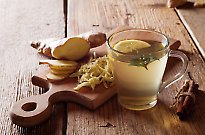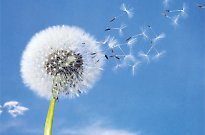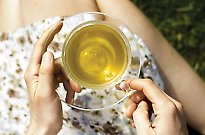
Natural detox: 5 body-cleansing herbal teas

From detox to tea-tox.
Accelerate detoxifying pathways in your body with these cleansing herbal teas.
When we think about detoxing, we often think about intense dieting and expensive products. But even sipping simple herbal teas could help support the body’s natural processes.
By drinking medicinal herbal teas in between meals, we can significantly increase our antioxidant intake, which supports the overall health of our body.
Additionally, certain herbal teas can support our organs of elimination, ensuring they detoxify more effectively. Here, Tara Throne takes us through a few herbal teas that won't disrupt your system.
1. Holy basil tea
Also known as tulsi, holy basil has been considered a sacred plant in India for thousands of years. Ancient Ayurvedic texts refer to this herb as the elixir of life – potentially for ability to conquer coughs, colds, indigestion, asthma, fatigue and more. Recent studies have shown holy basil’s ability to lower inflammation, lower cholesterol levels, eliminate toxins from the body, aid digestion, balance blood sugar levels and significantly reduce anxiety symptoms by conferring anti-stress benefits to those who drink it. This is thanks to its classification as an adaptogen. Adaptogens are compounds that increase our ability to handle stress by decreasing our cellular sensitivity to stressful situations. Holy basil has a unique flavour that’s sweet and delicious.
HOW TO PREPARE: Place two tablespoons of loose holy basil tea leaves into a French press and fill with boiling water (or, if you don’t own a French press, simply use a pot on the stove with three cups of water in it).
Infuse for at least 15 minutes. A longer steeping time will enhance the beneficial properties of the tea.
Strain (if using a pot) or plunge then pour into a mug or jar and enjoy hot or cold.
2. Burdock root and nettle tea
Burdock root and nettle are especially good at helping to detoxify the kidneys, making them powerful urinary cleansers. Burdock root, commonly used in Japan, is also very cleansing for the blood and possesses skin-healing properties. It’s a strong hormone-balancing and liver-detoxifying herb, which is important because the liver is the main calorie-burning organ in the body. By regulating fat metabolism, our liver is able to burn body fat when working optimally. Burdock root is also great for those suffering from eczema and psoriasis and is beneficial to the bowels because it’s rich in inulin, a prebiotic that feeds the good bacteria in our guts, (note: this might irritate those who suffer from IBS). Nettle is rich in a plethora of nutritional compounds including quercetin, serotonin, chlorophyll, amino acids, carotenoids, flavonoids, calcium, magnesium, iron and more. It’s also very supportive to the adrenal glands, helping you to respond to stress better.
HOW TO PREPARE: Add two tablespoons of loose nettle tea leaves and one tablespoon of dried burdock root (chopped) into a French press or pot on the stove with three cups of water in it.
Infuse for at least 15 minutes.
Strain (if using a pot) or plunge then pour into a mason jar and store in fridge overnight to enhance the medicinal benefits of the teas.
Before drinking, add one tablespoon of blackstrap molasses.
3. Dandelion root tea
Commonly found growing along roads and nature strips and often thought of as a pesky weed, dandelion is actually a very powerful herbal tonic that has multiple health benefits. Some of these benefits include strengthening and supporting the liver, making it a superior cleansing herb and blood purifier. One of the ways it does this is by increasing bile flow. Making bile is one of the liver’s main ways in which it eliminates toxins, so this is extremely helpful when cleansing the body. The Chinese have used dandelion for thousands of years to aid in the proper functioning of the liver, kidneys, spleen and gallbladder, and it’s also been used to balance the menstrual cycle and reduce symptoms such as bloating, PMS and breast tenderness.
HOW TO PREPARE: Steep one teabag
of dandelion root tea in 500 ml of water
for 15 minutes.
Remove teabag and add one teaspoon of
raw honey (manuka is best) if desired.
Best consumed hot.
4. Turmeric ginger tea
Turmeric is a powerful digestive aid and liver stimulant, making it an excellent detoxifier. Ginger encourages sweating and acts as a bitter tonic, thus aiding sluggish digestion, improving bile flow and encouraging the proper digestion of fats. When combined together these two herbs make for a soothing yet powerful tea. Turmeric is also the primary anti-inflammatory herb in Ayurvedic medicine, making it beneficial to those suffering from inflammatory conditions such as arthritis and evidence is mounting to show curcumin (the active component in turmeric) to be an effective treatment for cancer and Alzheimer’s disease.
HOW TO PREPARE: Add around two centimetres of fresh ginger root sliced and one inch of fresh turmeric root (sliced) to two cups of boiling water.
Simmer for 15 minutes on the stovetop.
Strain and pour into mug to enjoy.
5. Rooibos green tea
Green tea contains high amounts of catechin polyphenols, which stimulate fat metabolism by promoting what’s called thermogenesis. Thermogenesis is a process in which the body generates heat by burning fat as fuel. Additionally, green tea boasts excellent amounts of antioxidants and anti-inflammatory properties. Studies have suggested that green tea may also protect against damage done by cholesterol and can help to prevent blood clots. As little as one cup of green tea per day appears to offer some protection against heart disease. Rooibos tea boasts antioxidants, has the potential to alleviate intestinal distress, and can inhibit glucose absorption from the intestines, making it a great tea for those wishing to better control their blood sugar levels. It’s also been shown to reduce stress levels by suppressing adrenal gland function.
HOW TO PREPARE: Place two tablespoons of loose rooibos tea leaves and one tablespoon of loose green tea leaves in a French press or pot on the stove filled with three cups of water.
Bring to a simmer for 15 minutes – do not boil (boiling green tea will result in a bitter, higher caffeine content beverage).
Strain (if using a pot) or plunge and then pour into a jar to enjoy hot or cold.
Please note, those with hypothyroidism might want to avoid green tea due to the fluoride levels it contains, which have the potential to disrupt thyroid function.
Are you a green tea fanatic? Read more about the benefits of matcha.


